新概念二册12课lesson12.ppt
- 格式:ppt
- 大小:1.28 MB
- 文档页数:20
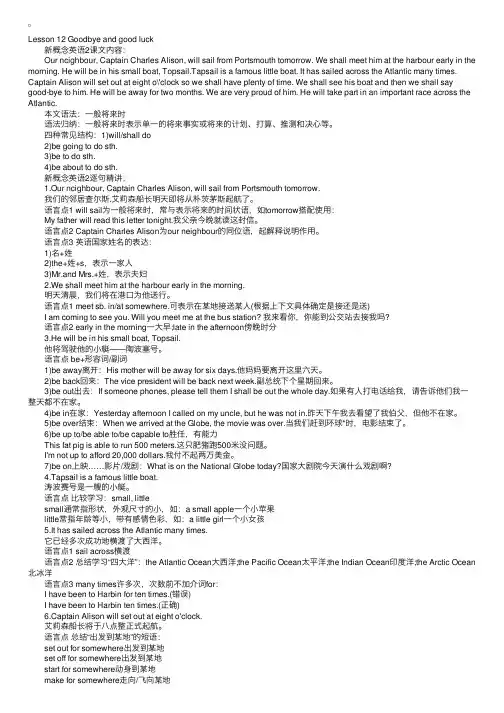
Lesson 12 Goodbye and good luck 新概念英语2课⽂内容: Our ncighbour, Captain Charles Alison, will sail from Portsmouth tomorrow. We shall meet him at the harbour early in the morning. He will be in his small boat, Topsail.Tapsail is a famous little boat. It has sailed across the Atlantic many times. Captain Alison will set out at eight o\'clock so we shall have plenty of time. We shall see his boat and then we shall say good-bye to him. He will be away for two months. We are very proud of him. He will take part in an important race across the Atlantic. 本⽂语法:⼀般将来时 语法归纳:⼀般将来时表⽰单⼀的将来事实或将来的计划、打算、推测和决⼼等。
四种常见结构:1)will/shall do 2)be going to do sth. 3)be to do sth. 4)be about to do sth. 新概念英语2逐句精讲: 1.Our ncighbour, Captain Charles Alison, will sail from Portsmouth tomorrow. 我们的邻居查尔斯.艾莉森船长明天即将从朴茨茅斯起航了。
语⾔点1 will sail为⼀般将来时,常与表⽰将来的时间状语,如tomorrow搭配使⽤: My father will read this letter tonight.我⽗亲今晚就读这封信。
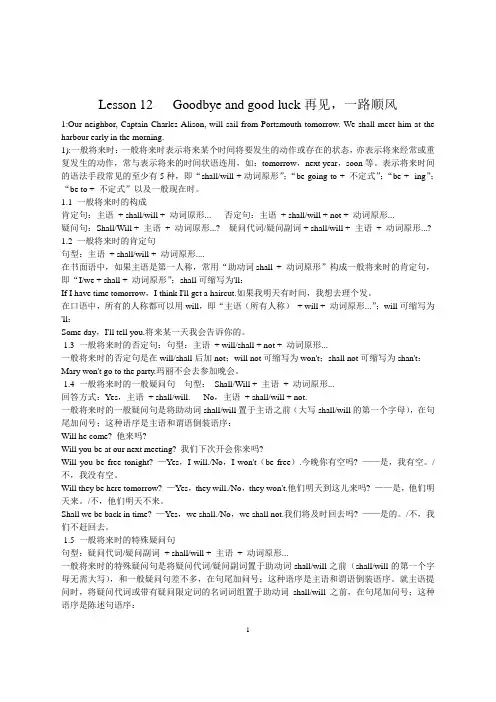
Lesson 12 Goodbye and good luck 再见,一路顺风1:Our neighbor, Captain Charles Alison, will sail from Portsmouth tomorrow. We shall meet him at the harbour early in the morning.1):一般将来时:一般将来时表示将来某个时间将要发生的动作或存在的状态,亦表示将来经常或重复发生的动作,常与表示将来的时间状语连用,如:tomorrow,next year,soon等。
表示将来时间的语法手段常见的至少有5种,即“shall/will + 动词原形”;“be going to + 不定式”;“be + -ing”;“be to + 不定式”以及一般现在时。
1.1 一般将来时的构成肯定句:主语+ shall/will + 动词原形... 否定句:主语+ shall/will + not + 动词原形...疑问句:Shall/Will + 主语+ 动词原形...? 疑问代词/疑问副词 + shall/will + 主语+ 动词原形...?1.2 一般将来时的肯定句句型:主语+ shall/will + 动词原形....在书面语中,如果主语是第一人称,常用“助动词shall + 动词原形”构成一般将来时的肯定句,即“I/we + shall + 动词原形”;shall可缩写为'll:If I have time tomorrow,I think I'll get a haircut.如果我明天有时间,我想去理个发。
在口语中,所有的人称都可以用will,即“主语(所有人称)+ will + 动词原形...”;will可缩写为'll:Some day,I'll tell you.将来某一天我会告诉你的。
1.3 一般将来时的否定句:句型:主语+ will/shall + not + 动词原形...一般将来时的否定句是在will/shall后加not;will not可缩写为won't;shall not可缩写为shan't:Mary won't go to the party.玛丽不会去参加晚会。


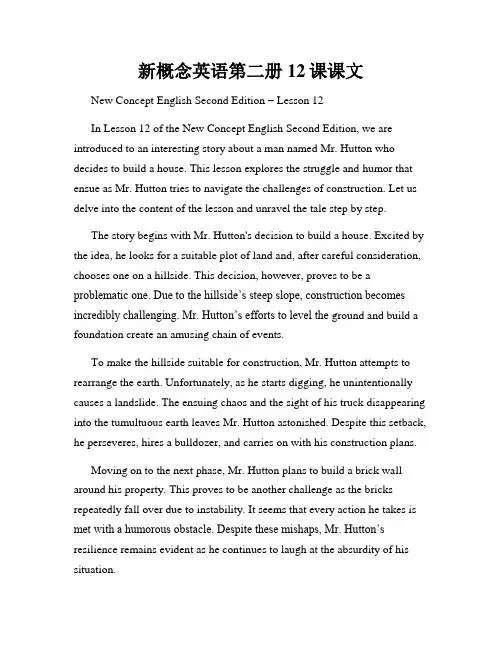
新概念英语第二册12课课文New Concept English Second Edition – Lesson 12In Lesson 12 of the New Concept English Second Edition, we are introduced to an interesting story about a man named Mr. Hutton who decides to build a house. This lesson explores the struggle and humor that ensue as Mr. Hutton tries to navigate the challenges of construction. Let us delve into the content of the lesson and unravel the tale step by step.The story begins with Mr. Hutton's decision to build a house. Excited by the idea, he looks for a suitable plot of land and, after careful consideration, chooses one on a hillside. This decision, however, proves to be a problematic one. Due to the hillside’s steep slope, construction becomes incredibly challenging. Mr. Hutton’s efforts to level the ground and build a foundation create an amusing chain of events.To make the hillside suitable for construction, Mr. Hutton attempts to rearrange the earth. Unfortunately, as he starts digging, he unintentionally causes a landslide. The ensuing chaos and the sight of his truck disappearing into the tumultuous earth leaves Mr. Hutton astonished. Despite this setback, he perseveres, hires a bulldozer, and carries on with his construction plans.Moving on to the next phase, Mr. Hutton plans to build a brick wall around his property. This proves to be another challenge as the bricks repeatedly fall over due to instability. It seems that every action he takes is met with a humorous obstacle. Despite these mishaps, Mr. Hutton’s resilience remains evident as he continues to laugh at the absurdity of his situation.As the story progresses, Mr. Hutton realizes that he has made a critical error in deciding to build the house on a hillside. The hillside’s unstable nature brings numerous problems, including additional landslides and difficulties in building a road. Mr. Hutton’s determination is commendable, but his choice of location becomes increasingly questionable.To add to his woes, the construction of the house proves to be equally challenging. Mr. Hutton faces constant setbacks and frustrations, including issues with electricity, water supply, and plumbing. These obstacles only serve to exacerbate his mounting frustration and question the feasibility of his project.Throughout the lesson, the author masterfully employs humor to portray Mr. Hutton's efforts and the challenges he faces. The story serves as a cautionary tale, highlighting the importance of careful consideration before embarking on any ambitious project. It also emphasizes the notion that sometimes, even with the best intentions, circumstances can conspire against us.In conclusion, New Concept English Second Edition – Lesson 12 tells the amusing story of Mr. Hutton's attempt to build a house on a hillside. By using humor to depict the challenges he encounters, the lesson engages readers while delivering a valuable lesson about the importance of sound decision-making. As we follow Mr. Hutton's misadventures, we can't help but appreciate the author's ability to entertain and educate simultaneously.。
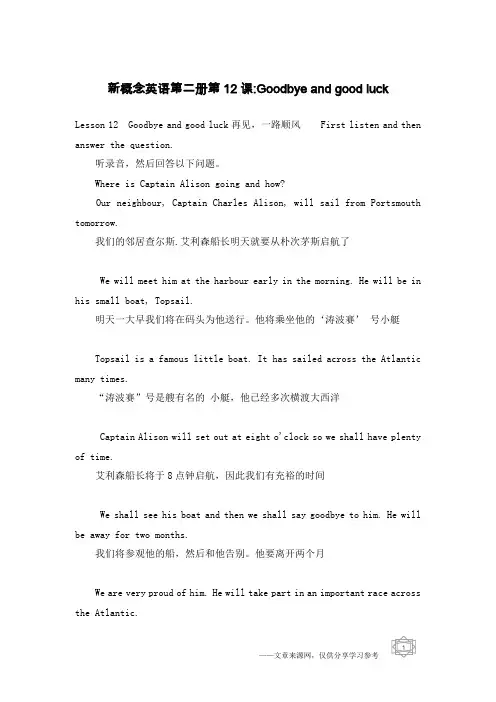
新概念英语第二册第12课:Goodbye and good luckLesson 12 Goodbye and good luck再见,一路顺风First listen and then answer the question.听录音,然后回答以下问题。
Where is Captain Alison going and how?Our neighbour, Captain Charles Alison, will sail from Portsmouth tomorrow.我们的邻居查尔斯.艾利森船长明天就要从朴次茅斯启航了We will meet him at the harbour early in the morning. He will be in his small boat, Topsail.明天一大早我们将在码头为他送行。
他将乘坐他的‘涛波赛’号小艇Topsail is a famous little boat. It has sailed across the Atlantic many times.“涛波赛”号是艘有名的小艇,他已经多次横渡大西洋Captain Alison will set out at eight o'clock so we shall have plenty of time.艾利森船长将于8点钟启航,因此我们有充裕的时间We shall see his boat and then we shall say goodbye to him. He will be away for two months.我们将参观他的船,然后和他告别。
他要离开两个月We are very proud of him. He will take part in an important race across the Atlantic.我们真为他感到自豪,他将参加一次重大的横渡大西洋的比赛New words and expressions 生词和短语luckn. 运气,幸运captainn. 船长sailv. 航行harbourn. 港口proudadj. 自豪的importantadj. 重要的Notes on the text课文注释1 Captain Charles Alison。
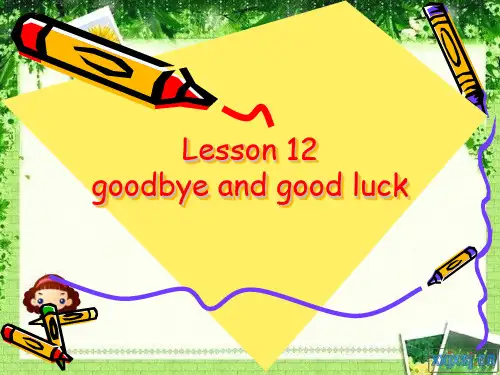
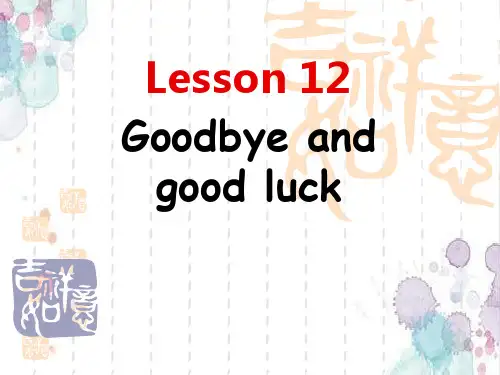
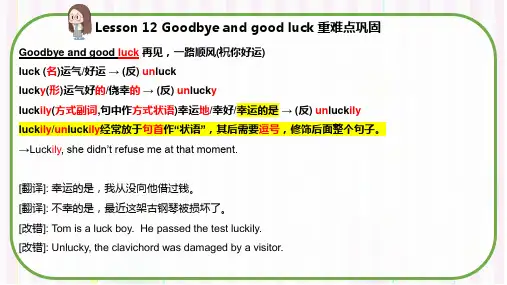
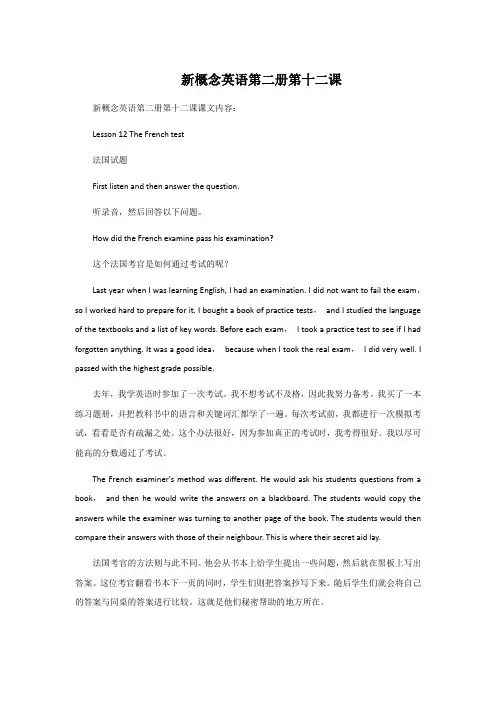
新概念英语第二册第十二课新概念英语第二册第十二课课文内容:Lesson 12 The French test法国试题First listen and then answer the question.听录音,然后回答以下问题。
How did the French examine pass his examination?这个法国考官是如何通过考试的呢?Last year when I was learning English, I had an examination. I did not want to fail the exam,so I worked hard to prepare for it. I bought a book of practice tests,and I studied the language of the textbooks and a list of key words. Before each exam,I took a practice test to see if I had forgotten anything. It was a good idea,because when I took the real exam,I did very well. I passed with the highest grade possible.去年,我学英语时参加了一次考试。
我不想考试不及格,因此我努力备考。
我买了一本练习题册,并把教科书中的语言和关键词汇都学了一遍。
每次考试前,我都进行一次模拟考试,看看是否有疏漏之处。
这个办法很好,因为参加真正的考试时,我考得很好。
我以尽可能高的分数通过了考试。
The French examiner's method was different. He would ask his students questions from a book,and then he would write the answers on a blackboard. The students would copy the answers while the examiner was turning to another page of the book. The students would then compare their answers with those of their neighbour. This is where their secret aid lay.法国考官的方法则与此不同。
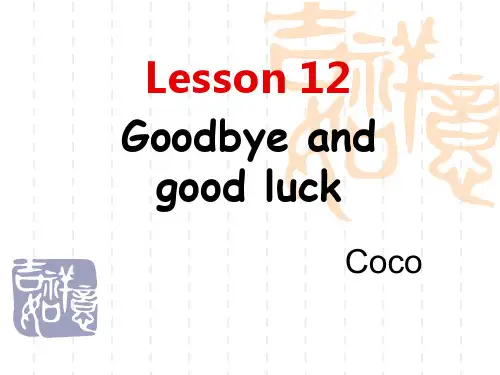
新观点二 Lesson 12讲堂内容Goodbye and good luckOur neighbour,Captain Charles Alison,will sail from Portsmouth tomorrow. We'll meet him at the harbour earlyin the morning. He will be in his small boat, Topsail. Topsailis a famous little boat. It has sailed across the Atlantic manytimes. Captain Alison will set out at eight o'clock, so we'llhave plenty of time. We'll see his boat and then we'll say goodbye to him. He will be away for two months. We arevery proud of him. He will take part in an important race across the Atlantic.Part 1 Basic words and expressions 1 luck n. 运气,好运good luckWish you good luck!祝你好运!bad luckby luck侥幸地I won the game by luck.我侥幸博得了这场游戏。
a piece of luck一件好事She told me a piece of luck.她告诉我一件好事。
lucky dog好运儿You’ re really a lucky dog!你真是个好运儿!2 captain n. 船长,将军Captain Jack was a great discoverer.杰克船长是个伟大的发现者。